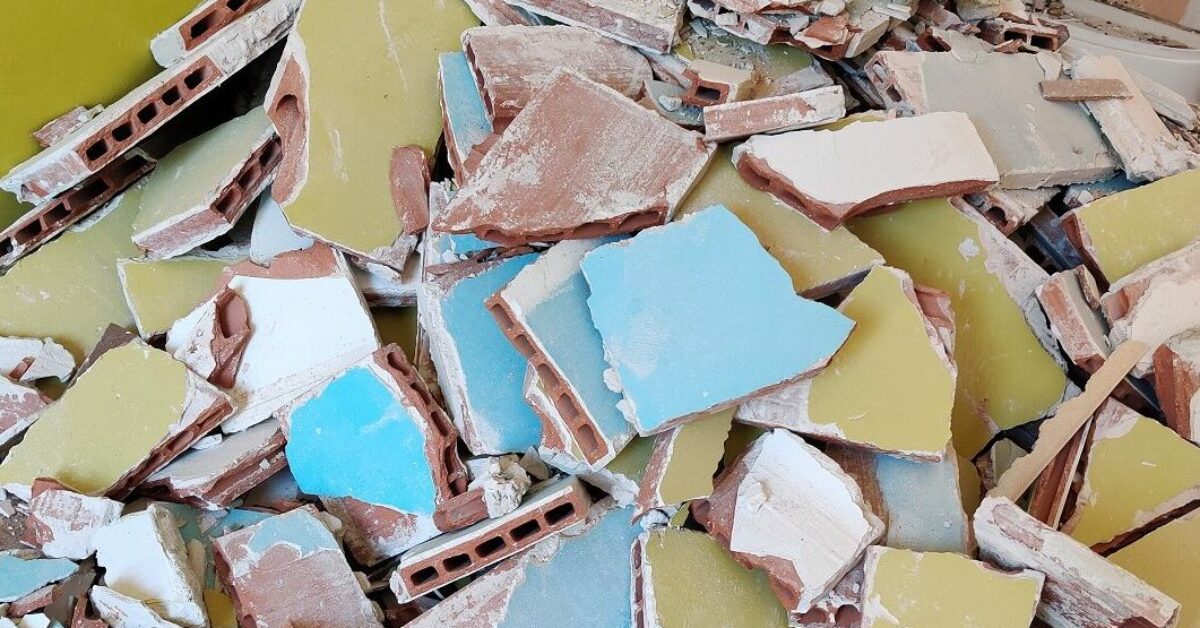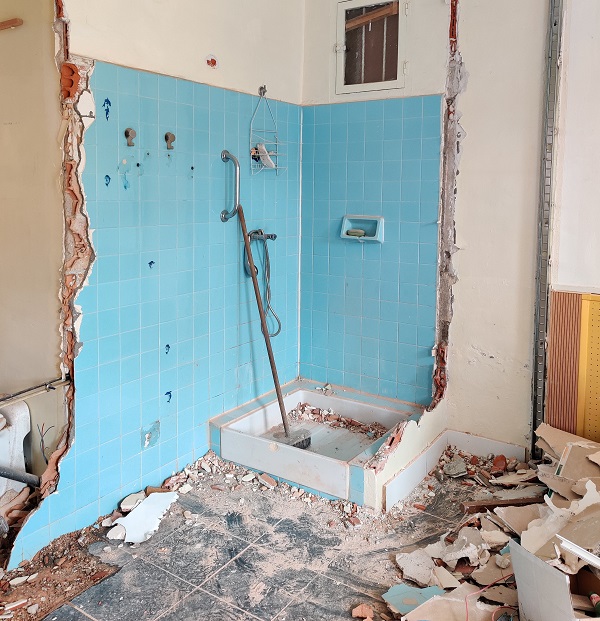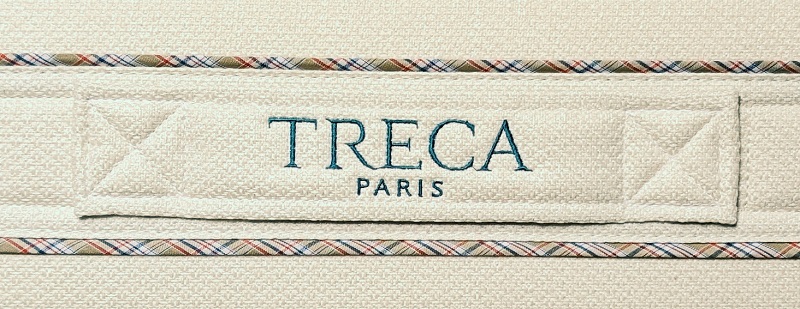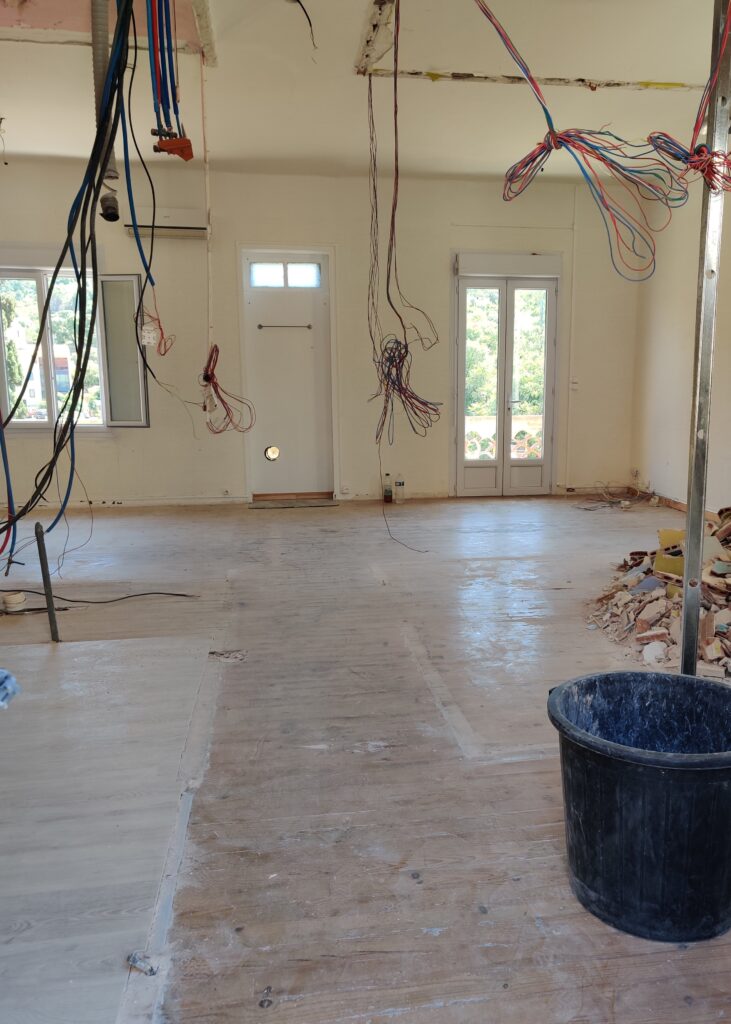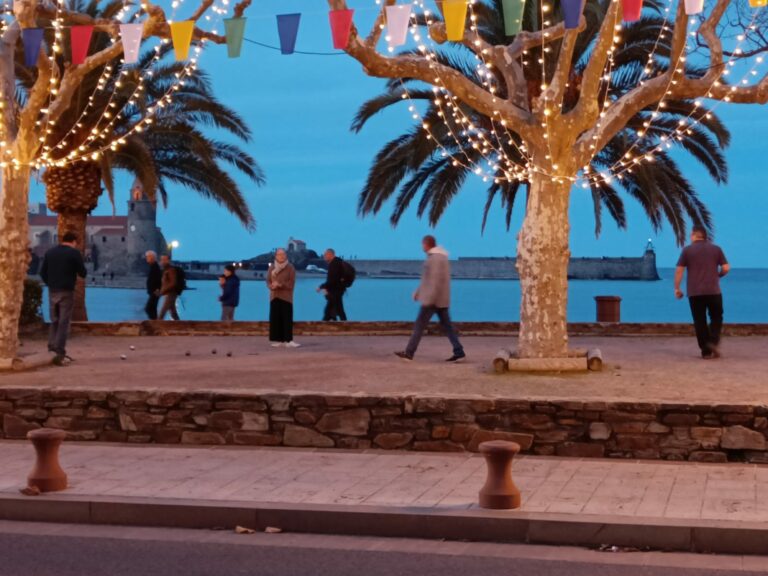Our plan was to live on the first floor while the second floor was renovated, then move upstairs while the first floor was renovated. (I’m going to spare you the confusing French way of counting building levels, where what Americans call the first floor is the ground floor, and the second floor is called the first floor, and so on.) The first floor had a bedroom, a small salon/dining area, a kitchenette, bathroom and separate WC, with a toilet that wasn’t properly bolted down. The furniture was a yellow-tiled trestle table, a brown pleather love seat, and a wooden sideboard, all left behind by the previous owners.
It took us less than an hour to unpack our five roller suitcases. I put my desk in the salon, and Jerrod set up his work space at the yellow-tiled trestle table in the dining area. We were so close I could hear Grand Theft Auto through his headphones. If I sat at the end of the table while he was dropping a handful of pasta into boiling water, I was liable to get scalded. We felt like we were living not in a sweet old Catalan house on a beautiful street in the South of France, but more like newlyweds in student housing at a state college that had fallen on hard times.
Jerrod was eager to start the renovation. Specifically, the demolition. “Really, how hard is it to knock shit down?” said Jerrod. “With the right tools, it’s a cinch!”
I suggested that maybe he take a minute to bolt down the tippy toilet, but that was far less exciting than the idea of doing anything with a sledgehammer.
He then spent the next three days chasing down good deals on Le Bon Coin (the Craigslist of France). He drove all over the region picking up tools: a demolition bar, an angle grinder, various hammers and saws, and a squat, blue and gray shop vac he bought from an old German in Leucate. He strapped the vac on the back of his motorcycle. He will now deny this, but at the time he confessed to pretending he was riding through France with R2-D2.
Meanwhile, we still needed a bed. I was grateful to have all the hand-me-down furniture, but I drew the line at the used mattresses. Used mattresses are the same the world over: Stained and saggy, they carry the ghosts of bed-wetters, orgy-makers, and often the tragic early death of a handsome junkie poet. They are gross. We stuffed our yucky inherited specimens into a storage closet and locked the door. We’d deal with them another time.
On a hot, humid afternoon, we drove to Porte d’Espagne, an unsightly shopping hub outside Perpignan. We stopped at the first maison de literie we saw. After dutifully bonjouring the guy behind the desk, we wandered around, sitting on one bed after another.
The expensive beds were in the back. Seeing us cruising among the high-end merchandise, the guy roused himself. He was tall and thin, and introduced himself as Steve. Steve asked who the bed was for. When we said, “us” he suggested that we choose a bed with ressorts—bedsprings—because it would suit our “morphology.” Presumably, the French are so small and thin their morphology does not require the support of springs. The affordable mattresses are no more than large chair cushions, infamous for offering no support whatsoever. They are the bralettes of the sleep industry.
Jerrod and I burst out laughing and said, in our American way, “You think we’re fat!” Steve didn’t contradict us. He asked how long we slept each night, in what position we slept, and whether we were the kind of sleepers who “tossed.“ I reported that I logged in a solid eight hours a night, slept on my left side, and did not toss. Jerrod said he slept six hours, slept on his back and both sides, and did indeed toss.
“I have just the bed for you.” Steve led us to the second most expensive bed in the store, a Treca, a “couture bed,” made in Paris. “It is the bed in the Hôtel de Crillon and other five-star hotels of Paris,” he said. Steve provided us with pillows, and produced a fitted sheet (a drap housse, pronounced impossibly drah-ow-se) for us to recline upon.
As we lay there, Steve stood over us and expounded on the wonders of the Treca. I stared up into his perfectly oval nostrils as he waxed poetic about the special type of ressorts in the Treca, world famous for their strength and mobility. Perfect for fat tossers like us with high credit card limits.
The Treca was comfortable. It was also completely out of our price range. Then I thought: This is probably the last bed I’ll buy in my life, so why not? To further rationalize, I recalled that the day before a couple on the rue gave us their old refrigerator, thus freeing up about four hundred euros. I patiently waited for Steve to reach the end of his recitation, and then said yes, we’d take it.
Now that we’d spent a fortune on the five-star hotel mattress, Jerrod was seriously antsy to start the demolition. Think of all the money we’d save if he knocked down all the walls himself! The bid we’d received for the renovation wasn’t unreasonable, but if he could do the demo, we’d at least save the cost of the Treca.
Jerrod got to work on the second floor. He removed some shelving. Then a little moulding. Then the oven.
I begged him not to go crazy. There was one small detail we’d chosen to ignore. We still didn’t technically own the place. We’d forked over the down payment, signed all the papers, but were still awaiting receipt of the acte de vente, the deed of sale.
“I don’t think it’s a good thing to be doing this. What if the sale doesn’t go through?”
“It’ll go through.”
“You don’t know that. You don’t know anything more than I know.” I was the one taking care of the paperwork – all in French – and if I was largely clueless, then so was he.
“All the French people we know say it’s just another piece of paper stuck somewhere in the system.”
To humor me, Jerrod agreed that we should make an appointment with our affable French banker, to discuss the situation.
As always, we set aside a full hour. It’s always necessary in France to pretend you’re not there to do business, before getting down to business. Also, it was pure folly on our part to ever expect an update on something we might we waiting for – like the acte de vente. Our affable banker never contacted us unless he had something concrete to report. “Checking in” doesn’t seem to be a thing here. “Thought you might like an update” is a subject line that no French person has ever typed at the top of an email in their life. Accosting our affable banker with emails written in impeccable French did nothing to coax a response. Nor did leaving a peppy voice message. Things here just take the time they take.
In the meantime, he was happy to spend hour-long meetings offering us restaurant recommendations, suggesting a good wine or two, and advising us when a certain cheese was in season (Brie has its own season, just like berries. Who knew?).
That day I asked about the acte de vente. Where was it? Our affable banker tapped a bit on his computer, made a phone call, tapped some more, then said, “You will receive it in the mail. And don’t forget to try the Saint Nectaire, a semi-solid cheese that comes from the Auvergne. It’s one of my favorites.”
He was right. Two days later, the acte de vente arrived in the mail. We celebrated with some Saint-Nectaire, which was creamy and earthy and paired it with an excellent glass of Bordeaux, just as he’d suggested.
Jerrod was thrilled to start on the “demolishments.” He strapped on his toolbelt (the proper tools also require the right tool belt), bounded out the front door and took the steps of the staircase two at a time to the second floor.
Once inside, he swung a hammer at the first wall he came upon. Hoping to smash open a hole, the hammer made a modest dent. He pulled out a small sledge hammer and, after ten minutes of bashing, managed to create a small opening. He poked his head inside and took a look. The wall was made of brick. He tried another wall. It, too, was made of brick. Demolition is only a cinch, it turns out, when you’re talking sheetrock and wood, or lathe and plaster. Unbeknownst to us, we were living in the third little pig’s house. Talk about your sturdy morphology: all the walls were made of brick, and they were all four inches thick.
Twenty minutes later, he gave up.
The next Tuesday, our jovial bilingual contractor arrived with his moody subcontractor and his crew. In a single day they demoed the entire top floor, leaving perfect ten-foot piles of brick wall. They were beautiful, those giant piles. They looked like art installations. Jerrod put away his tools, but not before fixing the tippy toilet.
Of course, it turns out, that tearing down walls, even when it’s difficult, is a lot less complicated than putting them up.
Karen Karbo is a frequent contributor to Frenchly. Her 2021 essay, Au Revoir Thanksgiving was the germ for this column. Karen is the author of fourteen award-winning novels and works of non-fiction including the international bestseller, The Gospel According to Coco Chanel. Her essays, articles and reviews have appeared in Elle, Vogue, O., The New York Times, Tin House, Salon, Slate and elsewhere. To connect with her, buy her books, and learn about her writer’s retreat in Collioure, please visit her website here.
Photo credits, Karen Karbo, top to bottom: Former Funky Bathroom; Couture Bed; The Second Floor is Demoed!

